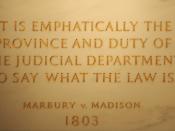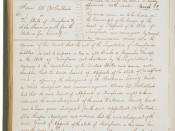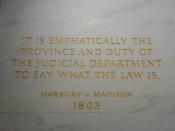Court Decisions
1)Marbury v. Madison (1803) - On the last day of his presidency, President Adams appointed William Marbury as the justice of peace for the District of Columbia. However, the new secretary of state, James Madison, chose to shelf Marbury's commission. Marbury sued Madison for its delivery. In this case, Chief Justice Marshall knew that it would not be delivered and chose to dismiss Marbury's suit. Marshall claimed that the part of the Judiciary Act of 1789 on which Marbury tried to base his appeal on was unconstitutional. Marshall came out with the principle of "judicial review". This principle had the idea that the Supreme Court alone had the last word on the question of constitutionality.
2)McCulloch v. Maryland (1819) - This suit involved an attempt by the state of Maryland to destroy a branch of the Bank of the United States by imposing tax on its notes.
John Marshall declared the bank constitutional by invoking the Hamiltonian doctrine of implied powers. By ruling against Maryland, he further strengthened the term of "loose construction".
3)Cohens v. Virginia (1821) - In this case, the Cohens family is found guilty by the Virginia courts of illegally selling lottery tickets. The Cohens appealed to the highest tribunal. Virginia "won", in the sense that the conviction of the Cohens was upheld. However, Marshall asserted the right of the Supreme Cout to review the decisions of the state supreme courts involving the powers of the federal government.
4)Gibbons v. Ogden (1824) - also known as the "steamboat case"; occurred when New York tried to grant a private concern a monopoly of waterborne commerce between New York and New Jersey. Marshall reminded them that the Constitution stated that Congress alone controlled interstate commerce.
5)Fletcher v. Peck (1810) - When a Georgia legislature was bribed,


